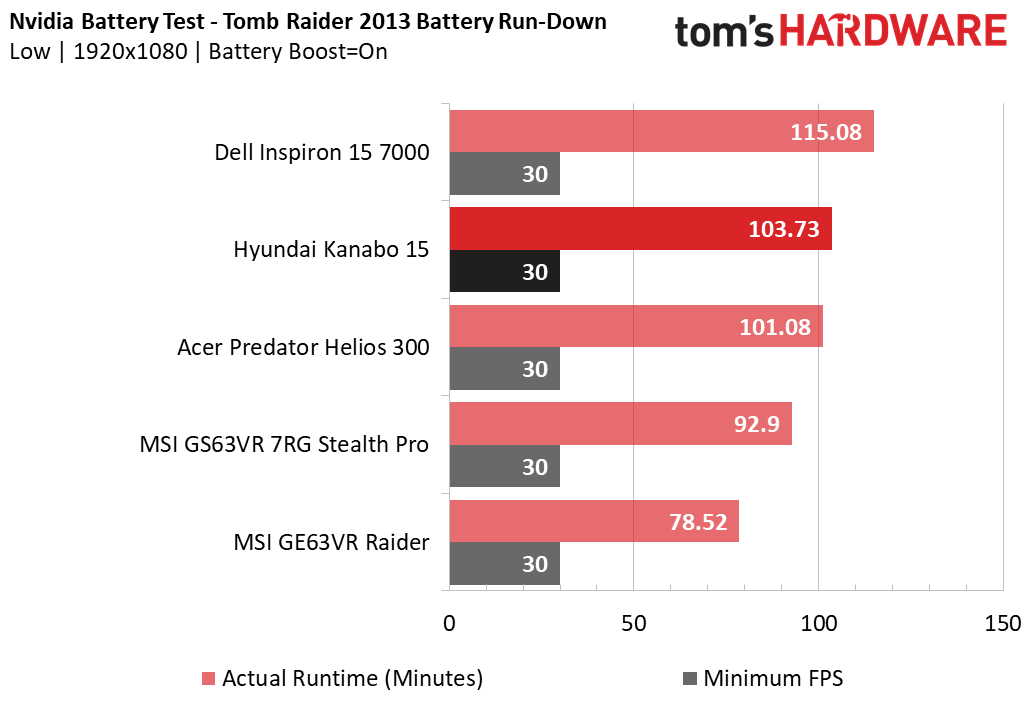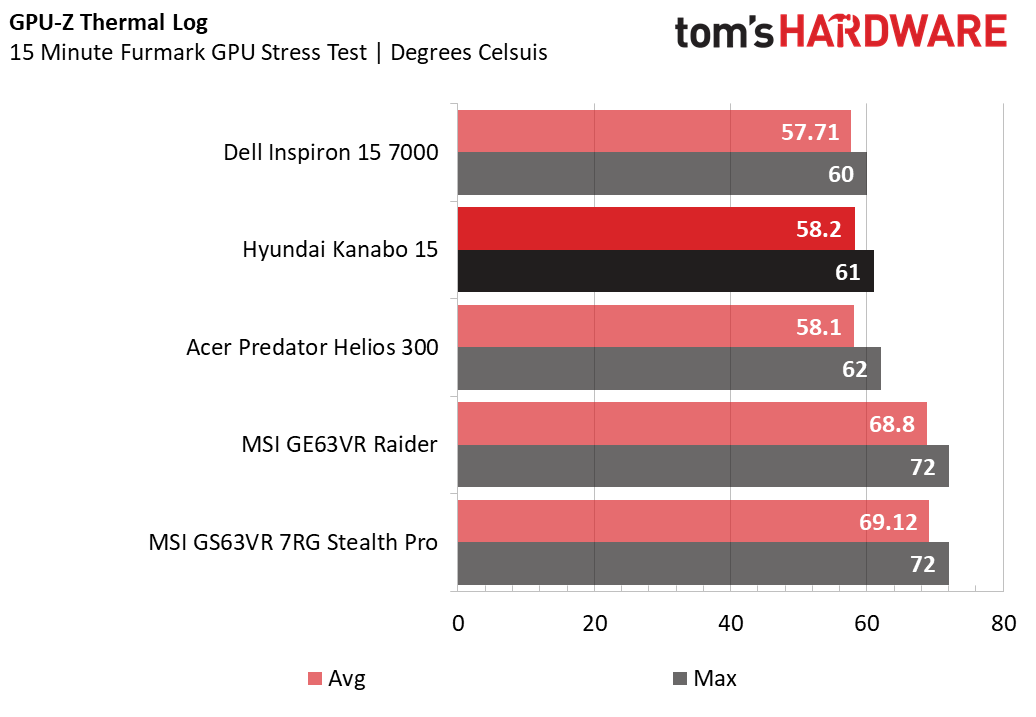Hyundai Kanabo 15 Gaming Laptop Review: Expensive Excellence
Why you can trust Tom's Hardware
Battery & Thermal Tests
Battery Test - Tomb Raider 2013 Battery Rundown
To test battery life, we set each laptop’s battery profile to Balanced while running Tomb Raider’s built-in benchmark at the lowest detail preset. The frame rate is locked at 30 FPS through GeForce Experience’s Battery Boost to limit the strain on the battery. Meanwhile, a script running in the background monitors and time stamps the system’s battery percentage. The laptops are set to hibernate once battery levels reach 5%. We test the battery life at 200 nits.
The Hyundai Kanabo 15 contains a 4-cell 47.52 Wh lithium ion battery, which we found to be rather small considering the Kanabo’s size; many laptops of similar dimensions have at least 50 Wh batteries. For example, the MSI Raider is equipped with a 51Wh battery, while the Dell Inspiron has a 56 Wh battery. The Acer Helios has a 48Wh battery, which is about the same size as the Kanabo’s. Even the MSI Stealth Pro, a Max-Q laptop with a thin chassis, has a larger 51 Wh battery. Keep in mind that the Kanabo has a hot-swap slot for its battery; an integrated solution might have allowed for a larger capacity solution.
The resulting battery life is straightforward. The Hyundai and Acer laptops have nearly the same configuration and battery, so the difference in battery life is miniscule. The Stealth Pro’s Max-Q GTX 1070 consumes more power than the GTX 1060, so it drains its battery faster. This is exaggerated further in the MSI Raider, whose standard GTX 1070 consumes even more power. The only laptop that definitively outlasts the Kanabo is the Dell Inspiron, whose larger battery is paired with less demanding components, such as the i5-7300HQ and the Max-Q GTX 1060.
Thermal Testing
Typically, we use our Optris PI 640 infrared camera to measure the laptop’s thermals. However, the Kanabo’s internal structure features a large plastic shroud that obscures the cooling solution, preventing us from getting an accurate reading. For situations like these, we can use the average and maximum temperature from a GPU-Z’s thermal log. For more information about how we test, check out our Measurement Science article.
The Kanabo has a similar configuration to the Acer Helios, which is around the same width, so it should come as no surprise the two perform at virtually the same temperature after a Furmark stress test. The Kanabo reaches a maximum temperature of 61°C (142°F) as opposed to the Acer’s 62°C (144°F), which is insignificant considering how cool they both run. MSI’s Raider and Stealth Pro are thinner than the Kanabo and contain more power-hungry components, therefore generating more heat. Once again, the Dell Inspiron pulls ahead of the Hyundai, but only because its components don’t generate as much heat as the latter.
MORE: Best Gaming Laptops
MORE: Gaming Laptop Previews
Get Tom's Hardware's best news and in-depth reviews, straight to your inbox.
MORE: All Laptop Content
Current page: Battery & Thermal Tests
Prev Page Gaming Benchmarks Next Page Price Analysis & Conclusion-
Firion87 Isn't anybody wondering since when does Hyundai build laptops throughout this entire article?Reply -
dxkj21 http://www.eluktronics.com/MECH-15/ This isnt even a new chassis design, the MECH-15 and Im sure others have used this for a whileReply -
-Fran- Ugh... I would love to like this, but I can't.Reply
The Asus GL502VS-FY385T is a 15.6" with a 1070 within striking distance in price and not of the bulk (I have it) shown here. It's more often than not with massive discounts, so if you can shell the extra shekels, by all means get it instead.
Cheers! -
fullauto2009 ne1 paying 1200 bux for a 7700 hq with a 1060 is on drugs. I always lol at how toms advertises tech at way high price points.Reply

